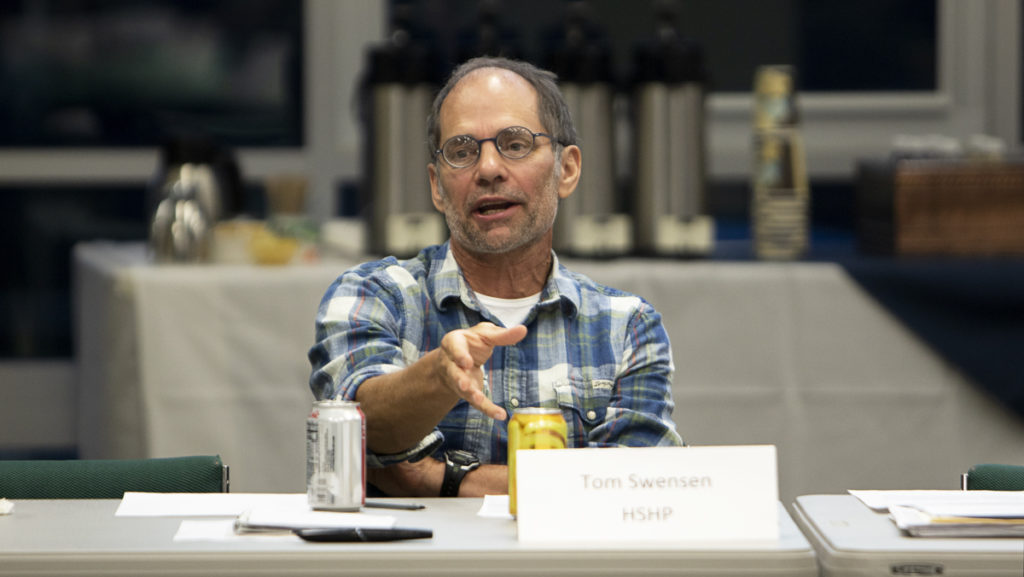Guilherme Costa, vice president of legal affairs, attended the Faculty Council meeting April 2 to discuss student and faculty copyright ownership of intellectual property at Ithaca College.
Costa said intellectual property refers to work created by faculty, like syllabi and their resources for a class. It also refers to work students create under a faculty member’s jurisdiction. Costa asked for feedback on the intellectual property policies at the college from the Faculty Council because the college is looking to amend them.
Costa said the current policy on student work at the college differs from the typical policies of higher-education institutions. Currently, the college deems any work created by a student in a class under the jurisdiction of a professor to be the property of the faculty member or the college. Costa said this means that if the faculty member earned any royalties, they would be required to share it with the college but not with the student who created it.
Costa said that normally among higher-education institutions, student-created work is the copyright of the student. In this case, the student would earn any royalties associated with the work. For commissioned work, the person who made the commission would own the copyright. Because the work was paid for, the person who paid for it owns the work.
Jason Harrington, associate professor in the Department of Media Arts, Sciences and Studies, said he was surprised to hear that this was the current policy at the college because he remembers the Faculty Council discussing and changing the policy four years ago.
“Not very long ago, we addressed this issue,” Harrington said. “We felt like we had won a victory by giving students the ownership of their projects that they made in our classes, and I’m surprised to hear [Costa] say that that is not the current rule, because we already did this work.”
He said the council worked out the wording, which was approved in the meeting four years ago. He said the policy could be changed very quickly if the previous document was found. Other council members were leaning toward changing the policy to give students ownership of their own work.
At a Faculty Council meeting Sept. 1, 2015, the Faculty Council unanimously voted in favor of accepting an amended version of the Intellectual Property Rights Document, which would give students ownership of their work.
Costa said there is no current policy on syllabi and other work created by faculty for use in classes. The policy currently states that faculty own the copyright for any work they create. Costa said this means that when a faculty member leaves unexpectedly during a semester or retires and that same course is continued, the faculty member that picks up the course would not be able to continue in a way that is consistent for the students.
Costa said most higher-education institutions, like Cornell University, have a policy in which the faculty member keeps copyright of the work but the institution can license that work for future use. For example, Cornell requires all individuals to assign the rights of any work conducted through the university to the university.
“You — the faculty member, as the creator — own it, for sure,” Costa said. “But the college has a license to use that work product in the education of its students, moving forward.”
Costa said he suggests that the college keeps the copyright of the work with the creator but allows the college to license the work.
Rebecca Lesses, associate professor and Jewish studies coordinator in the Department of Jewish Studies, said that if the work is going to be licensed by the college, then the professors should be paid for that work and for transferring the materials to the college when they choose to leave the institution. She said that if professors are forced to do this without pay, then the institution would be unfairly making money off of their work.
“If, suddenly, we now are forced to agree to this limited license of our material, we should be then paid for it on top of our salaries,” Lesses said. “This strikes me as theft. This has to go far beyond what the law permits the college to do. It seems to me that there’s a matter of ethics here.”
Costa said the work would still be owned by the creator — the faculty member — after they leave the institution. The college would only have a license to the materials for the purpose of advancing education.
David Gondek, associate professor in the Department of Biology, also attended the meeting and asked the Faculty Council for feedback on updating the content in the Risk Management policies because he will be serving as the faculty liaison for Risk Management. Risk Management policies intend to “minimize the adverse effects of accidental losses as well as business losses to the College,” according to the college’s website.
Duncan Duke, associate professor in the Department of Management, said the college should do a cost–benefit analysis when assessing the risks associated with traveling with students due to the fact that faculty often opt out of doing field trips or other travel with students because it is so difficult to go through Risk Management to go on these trips. Currently, according to the college’s website, faculty must fill out several forms and contracts to travel with students. After those forms have been filled out, Risk Management will work with faculty to identify risks associated with the trip and help come up with a plan to minimize and address them.








